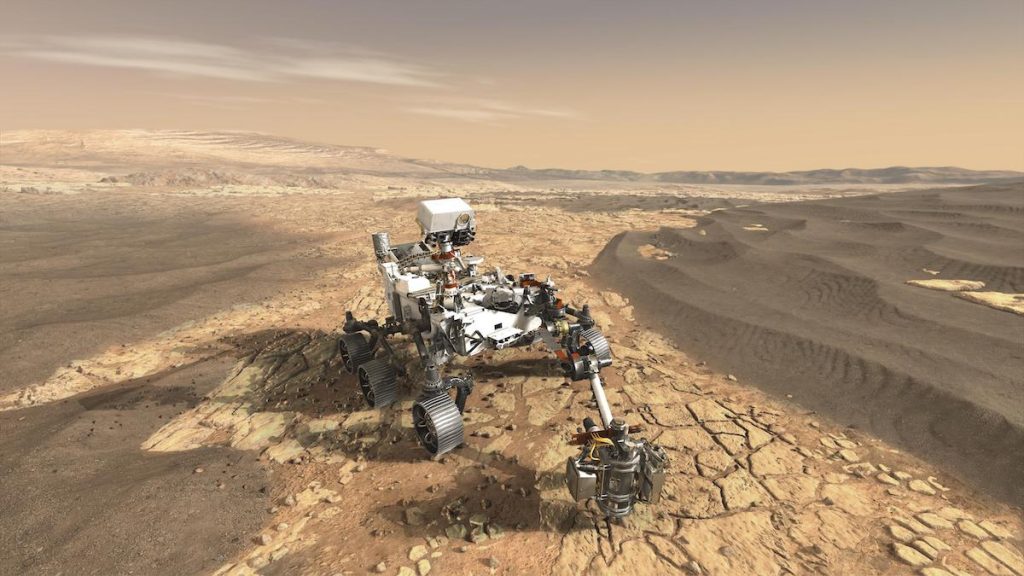Culture
L.A. Musician Captures Martian Sound
By: Emily Votaw
Posted on:
Humans have marveled at the heavens for pretty much as long as we have been recording our thoughts. While we have managed to capture dazzling images of our home galaxy (and beyond), one might be surprised to learn that we know far less about what that ever-intriguing vastness sounds like.
On Thursday, February 18, 2021, NASA’s Perseverance Rover landed on the rocky red Martian crust – and, for the first time ever, captured a snippet of accompanying Martian sound. The audio is brief, but enlightening: capturing the oddly familiar sound of wind gusting some 33.9 million miles away from Earth. Although the microphone did not record the sound of the rover’s landing, the ambient sound it did capture is still a landmark achievement.
The audio is the culmination of work put into motion by Jason Achilles Mezilis, a Los Angeles-based rock musician, composer, and “extraterrestrial audio engineer.” Mezilis has been a working musician for all of his adult life, performing with several rock bands — Owl, Black Belt Karate, Your Horrible Smile — as well as recording and releasing solo material and working with Hungarian and Czechoslovakian symphony orchestras to record his work. He’s also done extensive production work, recently assisting Guns ‘N’ Roses keyboardist Dizzy Reed with a forthcoming album.

About two months after the successful capture of Martian audio, Mezilis spoke to an Ohio University School of Media Arts & Studies class via Zoom – one of many presentations that Mezilis has made since the February landing in the hopes of inspiring budding minds whose talents might also be useful in ways they’d never had imagined.
During a Zoom interview with WOUB Culture following that April 2021 presentation to Ohio University students, Mezilis emphasized that while he did not design the microphone used by NASA on the Perseverance Rover, he did assist in the final selection of the microphone.
“I don’t want people thinking I chiseled this thing out of stone or something,” he said. “A lot of people worked on this system, a lot of brilliant engineers on the integration side with the digitizer and everything — but the hardware selection was what my team was responsible for.”
The seed for this project dates back all the way to Mezilis’ youth – he said he’s always been a bit of a “space groupie.”
Several years ago, at an open house event focusing on NASA’s plans for Mars Rovers at the Griffith Observatory in L.A., Mezilis met and befriended NASA Jet Propulsion Laboratory Robotics Engineer Joseph Carsten.
“We started hanging out, having lunches every couple months. I’d asked him ‘how’s life on Mars?’ and he’d asked me how life was as a musician,” said Mezilis.
During one of those hang-outs in 2016, the two began talking about the visually stunning nature of the Curiosity Rover’s landing – and Mezilis began to wonder what that kind of landing might sound like.
“We started considering – what about capturing audio? How, how hard could that be? You know, it’s pretty hard, actually,” said Mezilis.
It was this conversation that motivated Mezilis to research further – finding out that not only that sound had never been captured on Mars, but that NASA was actually planning to capture sound during their Perseverance Mission. At that point, Mezilis started to pursue the project more aggressively, soon securing a position as an independent contractor at NASA’s Jet Propulsion Lab working on the Entry, Descent, and Landing camera system that the Perseverance Rover would be equipped with.
Obviously, there aren’t a lot of other rock musicians with resumes like Mezilis’ contributing to NASA’s missions, but Mezilis said that it was actually his sort of status as an “outsider” to that world that allowed him to contribute even more meaningfully.
“I think a very important part of what I bring in my work with NASA is a fresh perspective, one that draws perhaps more from the kinds of interests that the general public might have. Of course, the gains of science are the most important thing when we are talking about this kind of work, but I think my work throughout my life as a professional entertainer positions me to better know how the public can become more engaged with this kind of scientific inquiry,” said Mezilis. “Some might question the value of that, but, ultimately – when you’re talking about a government funded organization like NASA, you need the public’s support. We need to get people excited about it, because even coming from the angle of getting kids excited about space – the more kids are excited about something, the more their parents will be excited about it.”

